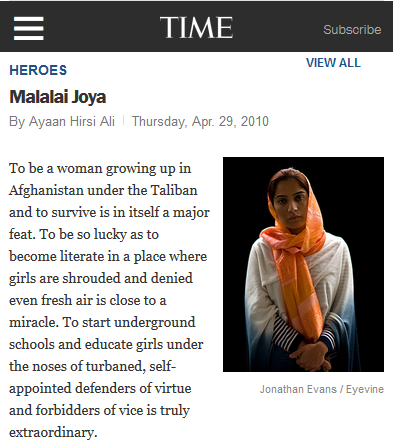By Peter Hart
Peter Hart interviewed Sonali Kolhatkar about women in Afghanistan for the October 10, 2010, episode of CounterSpin, an interview that was rebroadcast on the July 21, 2017, show. This is a lightly edited transcript.
Janine Jackson: Media are celebrating the participation of Afghan girls in a robotics competition in DC after being denied visas twice as somehow a feel-good story about America. No one seems to have pondered the irony of the denial, given that Afghan girls doing science is precisely the sort of PR moment the US pretended the 2001 invasion was all about. It could have opened a talk about what decades of unending war on Afghanistan have actually done towards that ostensible goal, but it did not.
CounterSpin discussed the war as feminist storyline with author, activist and radio host Sonali Kolhatkar back in 2010. We’ll hear that conversation again on today’s show.
Peter Hart: As the US war in Afghanistan began, the cover of Time magazine on December 3, 2001, announced: “Lifting the Veil: The Shocking Story of How the Taliban Brutalized the Women in Afghanistan. How Much Better Will Their Lives Be Now?” Almost nine bloody years later, with the war grinding on, the cover of Time magazine features a disfigured Afghan woman and the text, “What Happens if We Leave Afghanistan?”
The political context for both of these statements is fairly clear: One a hopeful signal that the war has been launched to liberate women in Afghanistan. And now, more recently, this week’s Time comes amidst growing doubts about that war, and the release of tens of thousands of classified documents that portray the violence and confusion of the US war.
As the Obama White House tries to craft a coherent defense of the war amidst talk of “timelines” and “benchmarks,” Time magazine is signaling that the original defense of the war should still hold up. But does their argument make sense?
Sonali Kolhatkar is host of the radio program Uprising, based at KPFK in Los Angeles. She’s co-director of the Afghan Women’s Mission and co-author of the book Bleeding Afghanistan: Washington, Warlords and the Propaganda of Silence. Sonali, welcome back to CounterSpin.
Sonali Kolhatkar: It’s my pleasure. Thanks, Peter.
PH: We’re probably beyond the point of asking how people felt when they saw this Time cover; the intent is so obvious and their editorial explanation suggests little in the way of nuance. Why Time did this is clear, as their managing editor Richard Stengel explained when he was on NBC’s Chris Matthews Show:
What we have brought to that country was freedom for women in a way that they’d never had before. Girls are going to school, women are in Parliament, women are on television.
The flip side, obviously, is that women are brutalized by the Taliban, and thus we must stay in Afghanistan. What do you think when you hear comments like Stengel’s, and see this cover story in Time magazine?
SK: The reality is much more nuanced than what most people like to admit. First of all, what Stengel says about us bringing freedom to Afghan women is ludicrous. There are a few things that Afghan women did gain as a result of the US defeat of the Taliban, and most of those were on paper. They were constitutional; there are now quotas in the government for women’s representation, and even a line in the constitution that says women are equal to men. But also in the constitution is the line that Islamic Sharia law is the supreme law of the land, and that was done in order to appease the US’s Taliban-like friends, who are just as misogynist as the Taliban.
And what neither Time, nor what many of these mainstream reporters admit, as well as members of the Obama and before that Bush administration admit, is that when it comes to women’s rights, as long as they’re our friends, it doesn’t matter if we undermine women’s rights with the empowerment of misogynist warlords. We create this distinction between misogynists who are enemies and misogynists who are friends, but to Afghan women, there is no difference.

Sonali Kolhatkar: “We create this distinction between misogynists who are enemies and misogynists who are friends, but to Afghan women, there is no difference.”
For example, in today’s Afghanistan under US occupation, there are record numbers of women in prison, languishing in prison, for these so-called “honor crimes,” that have been put there by judges appointed by our guy, Hamid Karzai. There are warlords with known histories of criminal, violent behavior, condemned across the world, that are in Parliament. Members of Parliament who are women have been kicked out of Parliament by men like this. This is supposedly the freedom that Afghan women got.
And under our own occupation, the Taliban, that many people in Afghanistan really reviled, are now becoming more popular, because they’re able to say that we’re fighting the US imperialism. And so in a strange way, the US has actually empowered misogynists on both sides of this war. The Taliban are becoming more legitimate among Afghan people, even though the majority of Afghan people don’t agree with their anti-women policies, but because they’re the only ones who are claiming that they’re protecting people from the bombs of NATO and the US.
The Time magazine cover should have said something to the effect of, well, this is what is happening to women under our occupation.
And another thing that Rick Stengel didn’t admit was that Afghan women did enjoy freedoms, to an extent, before the Soviet invasion in the late 1980s. And we forget that this history happened. It’s not like we freed Afghan women from some barbarism, and gave them a taste of freedom that they never knew. They had freedom, and they had some level and measure of freedom, but that was all set back because of war and foreign interference.
PH: You see that, actually, in the Time magazine piece, that there is a paragraph that mentions that 40 years ago, Afghanistan was a fairly cosmopolitan country, particularly in Kabul, so you get this sense that the piece is somewhat at odds with the cover. It begins to fall apart further when you think that this woman who’s portrayed on the cover, this happened to her last year, so the presence of US troops in her country did not help her one bit.
You do see this debate sort of breaking down along two lines, and it’s a very difficult debate to engage, but it’s the one that’s in the media. You have to support the US war in order to impede the growth or the spread of the Taliban, or you end this war and you unleash this wave of barbarism across the country. You’re given those two options in the media, and it seems like it’s very difficult to choose the latter.
SK: I think what a lot of people are missing is that the issue of women’s rights is essentially a red herring in Afghanistan. No one really cares about women’s rights; they only care about women’s rights when it becomes important to justify the war, for example, in 2001, and now when the support for the war is flagging. Inside Afghanistan, the issue of women’s rights—whether it’s legal rights, whether it’s political rights, human rights for women, etc.—it sort of changes with time, depending upon who’s in power in which locality. But who’s fighting wars, and which foreign armies are fighting wars, and which misogynist or fundamentalist warlords are fighting wars on the ground, makes little difference for women.
And so I think it should be made very, very clear to most people, women’s rights have always been a PR effort for the US military. They’ve always been part of the PR effort. Wars are not fought to liberate women. Wars are fought over power, but never to liberate women. And what really, really sickens me is groups like Feminist Majority. On Ms. Magazine, there was a blog post recently about this Time magazine article, where you see this sort of liberal feminist line that continues to buy the justification that the war is somehow going to protect Afghan women. You get the sense that they kind of want it to be, they want the war to be fought for women’s rights, and they just think that it’s not being done properly, but if we try hard enough, we have enough troops on the ground, somehow women’s rights will be better protected. And they’re completely missing the point, and really doing no justice to the term feminist.

PH: Now, finally, I see this in Time magazine, and my mind is drawn to a couple of months ago, where a very brave and well-known Afghan activist is named one of the most 100 influential people, and Time magazine erases her opposition to the war—at least tries to argue that that opposition to the war is something she needs to get over.
SK: Oh my goodness, you’re talking about Malalai Joya, and it was amazing that she was recognized by Time magazine. But you’re right, the little write-up of her in that announcement by Time magazine was essentially to say that she needs to listen a little bit more to the people who are ardently trying to help her, and that she doesn’t know better than those of us here in the United States, apparently, who are trying to liberate her and her fellow Afghans. It was such a slap in her face.
And I really encourage all of your listeners to check out her book that came out, A Woman Among Warlords. If you want to find out what Afghan women, and what a true Afghan hero, a woman like Malalai Joya, who is respected and loved throughout the country, what she really thinks about the US occupation, read her book. On page 1 of her book, she criticizes the US occupation, and she has long called for the occupation to end. And what she and other women’s rights activists in Afghanistan are saying: Right now, we have three enemies on the ground. We have the US and NATO occupation, we have the government warlords in the Parliament, and we have the Taliban. It’s better for us to fight against two instead of three enemies, and so they want the US and NATO out of there, and they essentially realize that they have to liberate themselves, because nobody’s going to do it for them.
PH: We’ve been speaking with Sonali Kolhatkar. She’s host of the radio program Uprising, based at KPFK in Los Angeles. She’s also the co-director of the Afghan Women’s Mission, and she co-authored the book Bleeding Afghanistan: Washington, Warlords, and the Propaganda of Silence. Sonali, thanks for joining us this week on CounterSpin.
SK: Thank you.




